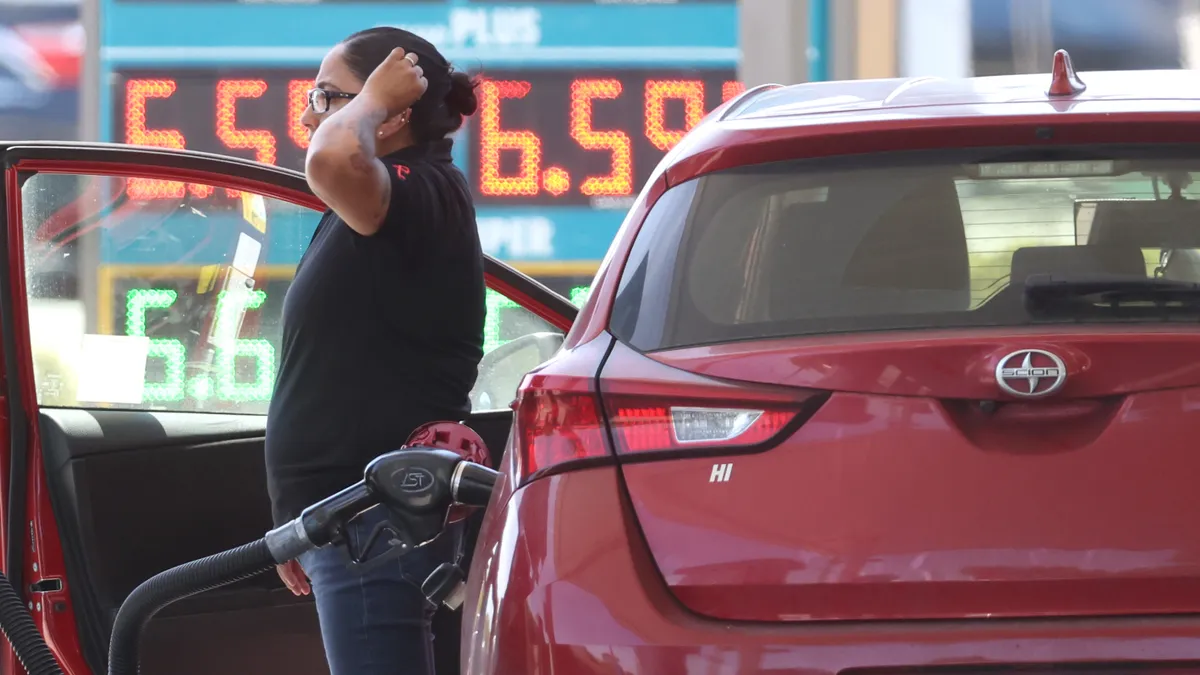Retail sales held up pretty well in the first half of the year, even accounting for inflation’s impact on the numbers. But with consumers spending more on food, gas and experiences instead of discretionary goods, it’s not clear how retail will do in the second half.
It’s been a head-spinning shift. Late in the pandemic, consumers were “flush with cash,” thanks to the federal government’s support and lighter spending on services like dining out, according to Wells Fargo analysts led by Edward Kelly.
“However, budgets are now being pinched as food prices ... fuel, and other everyday items remain elevated while stimulus/SNAP dollars dry up,” Kelly said in a Thursday research note on grocery retail.
The deterioration was seen quite clearly last month, when the usual Memorial Day spending bump didn’t materialize, according to research from The NPD Group. Due to inflation, consumers are spending more than they were pre-pandemic but getting less: Compared to May 2019, dollar sales were up 18%, but unit demand was down 1%. Furthermore, U.S. dollar sales of discretionary general merchandise ended 2% lower than last year’s results, while unit sales were 8% lower, per NPD.
"Budgets are now being pinched as food prices ... fuel, and other everyday items remain elevated while stimulus/SNAP dollars dry up.”

Edward Kelly
Senior Equity Analyst, Wells Fargo Securities
S&P analysts Sarah Wyeth and Diya Iyer pinpointed a week in May as “the official end to the good times the retail sector has been experiencing since 2021 as various macroeconomic data releases and earnings announcements forced the market to reconsider their view of consumers’ resilience in the face of decades-high inflation.”
Lower and middle-income consumers are feeling the pinch most keenly, according to their report. That showed up in the first-quarter results at Walmart and Target, though Kelly’s team at Wells Fargo observed share gains at lower priced retailers like wholesale clubs, mass merchants and dollar stores, which they believe will continue. Wells Fargo analysts also said that higher-income consumers could also change their behavior more drastically as the pressures get to them too.
As those analysts and others also note, households are dedicating more of their budgets to necessities. Spending at gas stations rose to nearly 5% of consumer spending in May, according to Earnest Research — almost 2 percentage points above historic levels and the highest level since Earnest began tracking this metric five years ago. Fuel prices have risen steadily since Russia’s invasion of Ukraine, Earnest researchers said.
While the consumer pivot seems stark, inflation has persisted for months now. Over the 12 months ending in April, total personal consumption expenditures prices rose 6.3%, or 4.9% not including food and fuel, Federal Reserve Chair Jerome Powell told Congress this week. Russia’s war in Ukraine and mangled supply chains still affected by the pandemic are major factors, he said.
“We are highly attentive to inflation risks and determined to take the measures necessary to restore price stability,” he also said, adding that the central bank will work to stay on top of any unintended consequences of its actions. “The American economy is very strong and well positioned to handle tighter monetary policy.”
Meanwhile, consumers are taking steps of their own. About a third told Jungle Scout researchers that they cut back on personal spending this quarter, while 24% said they spent more. The percentage of those who would switch from their favorite brand based on price rose 12% quarter after quarter, with nearly half saying a brand is their favorite because of low prices, according to Jungle Scout’s report.
NPD researchers found that 83% of U.S consumers plan to make changes to reduce their product spending in the next three to six months, making demand less predictable even compared to what retailers saw during the first two years of the pandemic. The trends have implications for the holidays, as peak shopping periods spread out and consumers buy lower-priced goods, according to Marshal Cohen, chief retail industry adviser at The NPD Group.
“Change is on the way when it comes to consumer spending."

Marshal Cohen
Chief retail industry adviser, The NPD Group.
“Change is on the way when it comes to consumer spending,” Cohen said in a statement. “As consumers partake in summer vacations, concerts, sporting events, and other service-based spending, general merchandise retailers must prepare for more intense competition for wallet share, but that is just part of the new pattern emerging.”














